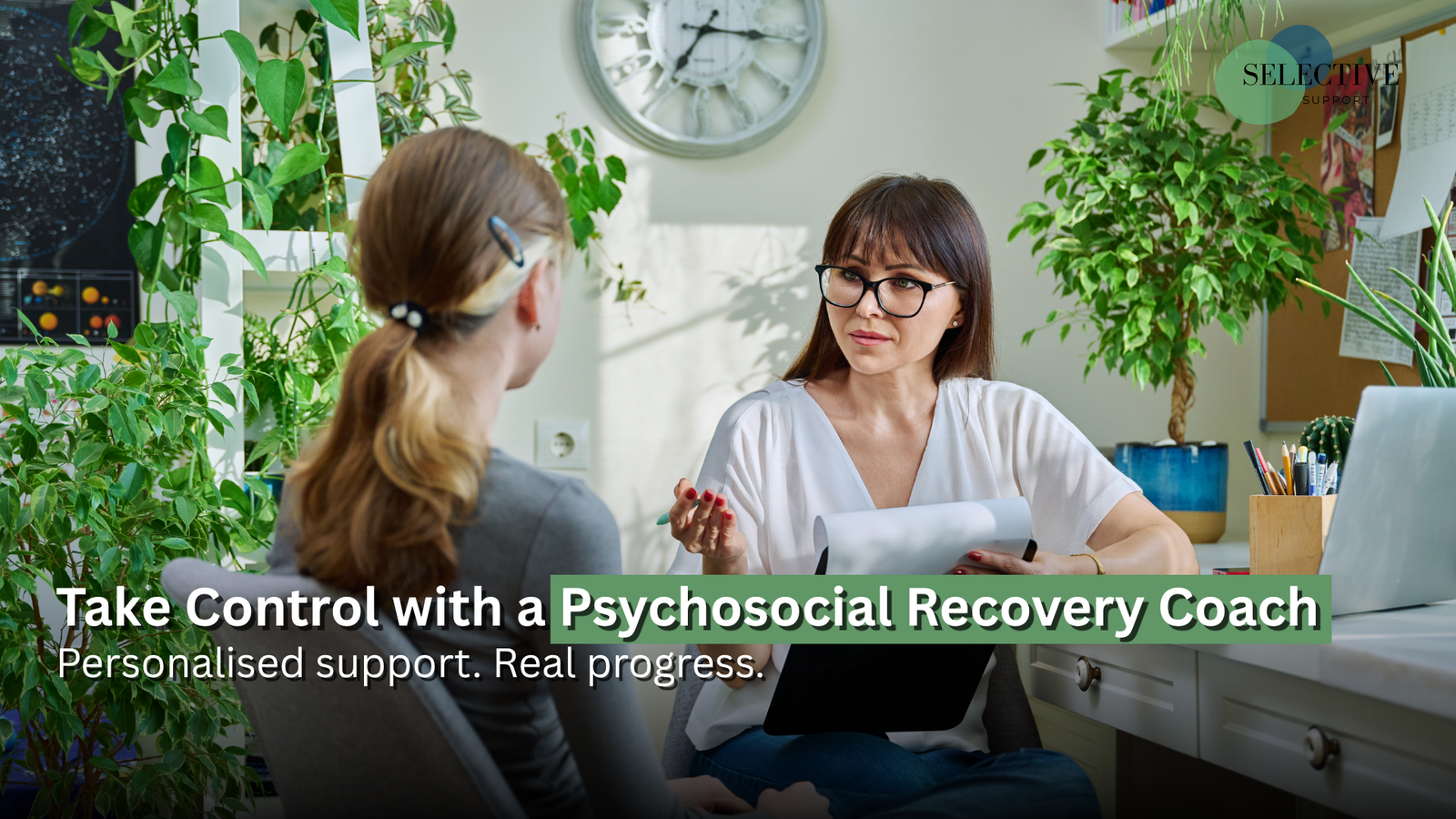Psychosocial Recovery Coach: 5 Ways They Help You Feel in Control
Have you ever stared at your NDIS plan and thought, “Where do I even start?” You’re not alone in feeling stuck or unsure, especially when things feel too complex or too fast. That’s exactly where a psychosocial recovery coach can make all the difference.
Unlike general support, a recovery coach is someone who helps you steady the wheel, giving you clear, step-by-step support with your mental health, your routine, and your NDIS goals. This post will walk you through five powerful ways an NDIS psychosocial recovery coach can help you feel more in control of your journey, not more overwhelmed.
1. A Psychosocial Recovery Coach Helps You Understand Your NDIS Plan
How an NDIS Psychosocial Recovery Coach Breaks It Down
If your NDIS plan feels more confusing than helpful, you’re not the only one. Many participants we meet say things like, “I didn’t even know I could use my funding for that,” or “It just sits there because I don’t know what it means.”
That’s where a psychosocial recovery coach comes in. Their role isn’t just to tick boxes, it’s to sit beside you, explain your plan in everyday language, and show you what’s actually possible. Whether it’s understanding what “capacity building” really means, or knowing which supports you can access, your coach makes it make sense.
As one of our clients, John, said:
“I used to ignore my plan because it was too much. Now, I know exactly what I can use and who to ask.”
2. A Recovery Coach Works With You to Set Realistic, Personal Goals
Why a Good NDIS Recovery Coach Doesn’t Rush Your Journey
When life feels uncertain, having a clear goal can give you something solid to hold onto, but setting those goals can feel like a mountain when you’re already managing your mental health. A good NDIS recovery coach helps you start where you’re at, not where someone thinks you should be.
Together, you might explore goals like:
- Creating a regular routine
- Rebuilding confidence in social settings
- Attending therapy or joining a local group
- Managing daily life with less stress
At Selective Support, we believe your goals should reflect your values, not a service checklist. We go at your pace, checking in often and adjusting along the way.
Let’s talk about your goals, even if you’re not sure what they are yet.
3. A Psychosocial Recovery Coach Builds Your Confidence and Routine
How Recovery Coaching Supports Your Mental Health Day to Day
For many NDIS participants, confidence doesn’t come from big breakthroughs, it comes from small wins repeated over time. That’s why your psychosocial recovery coach focuses on helping you build structure that fits your life and mental health, not anyone else’s.
This could mean:
- Setting gentle daily routines that feel achievable
- Creating a safe space to talk through challenges
- Encouraging activities that lift your mood or reduce anxiety
It’s not about fixing everything at once. It’s about walking beside you as you regain a sense of stability and self-trust. One of our clients, Nathan, had been avoiding public spaces for months. Together with his coach, he worked toward attending a local art group, now it’s part of his weekly routine.

4. A Recovery Coach Connects You to the Right Services Without the Stress
An NDIS Psychosocial Recovery Coach Knows Who Can Help
Scrolling through lists of providers, calling around, repeating your story again and again, it’s exhausting. A recovery coach takes that pressure off you by recommending the right services at the right time, based on what you need.
Whether it’s finding a psychologist who understands trauma, joining a community program, or organising transport to appointments, your coach becomes your go-to guide.
Tired of chasing services? We’ll walk with you and find what fits.
5. A Psychosocial Recovery Coach Checks In and Advocates for You
Why the Right NDIS Recovery Coach Stays With You, Not Behind You
A great psychosocial recovery coach doesn’t just show up once and disappear. They stay with you throughout your journey, checking in regularly to see how things are going, and stepping in when something needs to change.
That might mean helping you prepare for a plan review, updating your goals, or speaking up on your behalf if a service isn’t meeting your needs. Your coach becomes your advocate, someone who listens, understands, and acts in your best interest.
At Selective Support, we never hand you off to strangers. Your coach is your consistent point of contact, building trust and walking with you the whole way.
That’s the kind of support we believe in, honest, reliable, and there when it matters most.
Conclusion: You Deserve Support That Feels Human and Helpful
Taking control of your NDIS journey doesn’t have to feel like climbing a mountain. A psychosocial recovery coach can guide you step by step, helping you understand your plan, set goals that matter to you, build confidence and routine, find the right services, and stand by you as things change.
You don’t need to have all the answers to take the first step. At Selective Support, we offer more than just services, we offer real connection, ongoing guidance, and a coach who truly listens.
Ready to feel supported, not stressed? Get in touch with us at Selective Support today.
Your Questions About Psychosocial Recovery Coaching – Answered Simply
1. What is the difference between a psychosocial recovery coach and a support coordinator?
A psychosocial recovery coach provides all the functions of a support coordinator plus additional support for mental health and wellbeing. While both help you understand your plan and connect with services, a recovery coach also works closely with you to build emotional resilience, routine, and confidence in daily life. Think of them as your steady support partner for both planning and personal growth.
2. What are the goals of skills for psychological recovery?
Skills for psychological recovery aim to help you:
- Regain a sense of emotional safety
- Build healthy daily routines
- Develop problem-solving and coping skills
- Set and work toward meaningful personal goals
- Reconnect with supports and community
Your recovery coach works with you to shape these goals in a way that feels realistic and supportive for your life right now, no pressure, just progress.
3. What is an example of a psychosocial program?
A great example of a psychosocial program is a community-based art and wellbeing group designed for people managing mental health challenges. In this type of program, participants meet regularly to explore creative activities, build social connections, and develop emotional regulation skills, all in a safe, supportive environment.


